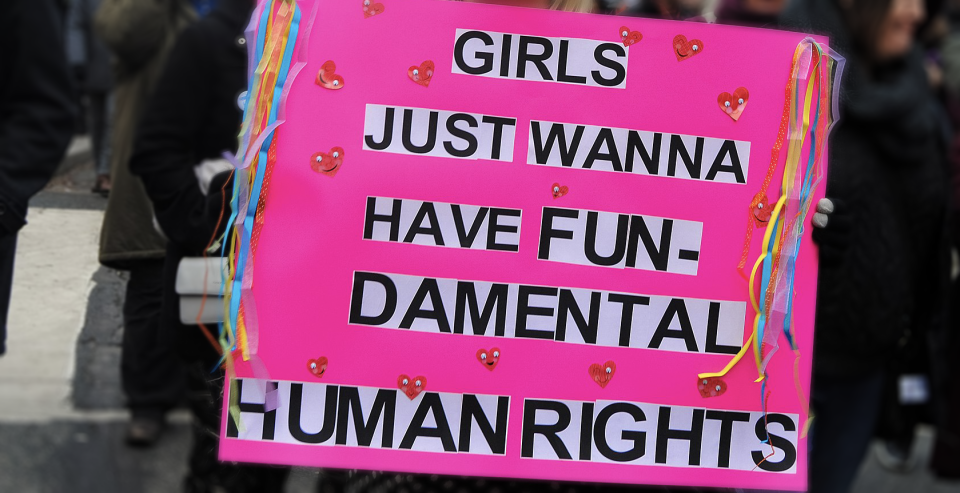
Original image sourced from
Wikimedia commons
In my previous columns I’ve discussed how women in the Global South are reclaiming social media to shine the spotlight on disability, celebrate being queer, promote body positivity, and combat femicide. In my final column for this series I’m going to look at how young womxn are using social media to foster change in educational spaces.
There are several ways that feminists can make social media work for activism. This kind of activism can help thrust womxn’s rights to the forefront of political agendas, but I acknowledge that it doesn’t always result in policy change or practical action. However, this doesn’t mean that social media activism doesn’t have its benefits.
This kind of activism can help thrust womxn’s rights to the forefront of political agendas, but I acknowledge that it doesn’t always result in policy change or practical action.
There’s a misconception that Gen Y and Gen Z are self-centred, lazy, narcissistic, and a whole host of other negative descriptions. A generation that expects everything to be handed to them on a silver platter but this narrative simply isn’t true. There are numerous people in these generations – and for the purpose of this column, womxn – who are passionate, driven and willing to put themselves on the frontline to stand for what they believe in, in order to bring about change in various spheres.
Don’t mess with my roots

Source: @florencemasetla
In August 2016, black students at Pretoria Girls High in South Africa protested against the entrenched racism they were experiencing at their school at the hands of staff members. The young womxn opened up about their experiences and shared them on social media. Not long after they started voicing their ordeals, #StopRacismAtPretoriaGirlsHigh began trending on Twitter, locally. Their bravery garnered the support of countless people across the nation and around the world. The racism they experienced included: being placed into groups according to their ethnicity (students of other races were not subjected to this), a hair policy that discriminated African textured hair, not being allowed to speak black South African languages, and being called monkeys.

Source: @CleuBrasil
Google translation: Afro hair is still a battlefield
The online and offline attention their campaign received helped their cries be heard. Following an intervention by the provincial minister of education, the school suspended their discriminatory policies and were ordered to improve the treatment of black students at the school.
By using social media, the students were able to empower marginalised voices, raise awareness about their campaign, and encourage advocacy. #StopRacismAtPretoriaGirlsHigh is a prime example of how social media can be employed to foster change.
#StopRacismAtPretoriaGirlsHigh is a prime example of how social media can be employed to foster change.
Moving from the south of Africa, let’s have a look at how womxn in Latin America are using social media to protest against sexism.
Does my skirt distract you?

Source: @marestreppo
Google translation: As girls, they taught us to criticize other skirts. Today we evolve to be pure brotherhood and fight together, demanding our right to use it, and short! (If we feel like it) #UPBenFalda
On 30th January this year, Pontifical Bolivarian University in Colombia posted a message on their website advising female students not to ‘distract’ classmates and teachers with low necklines, short skirts or tight-fitting clothes. Yip, this happened just a few weeks ago. The students decided they were not going to stand for this sexism and decided to protest. Using #UPbenfalda (“UPB in skirts”) on Twitter, the students called on womxn and men to wear short skirts to campus and post their images on social media under the previously mentioned hashtag.

Source: @ellashacenfalta
Google translation: All our support for UPB students who protested their institutional machismo #UPBenFalda Women (and men) demanding their rights!
The hashtag went viral and generated a great amount of support. Subsequently, the university removed the message from their website and claimed that the comments were meant only as “suggestions” and had mostly been aimed at new students starting at UPB. Although the university didn’t admit its wrongdoing, students made it extremely clear that sexism will not be tolerated on their campus. With the help of social media, they were able to make national and international headlines, start a viral campaign, gather global support and make the university retract their sexist message. Another example of the power of social media activism.
Although the university didn’t admit its wrongdoing, students made it extremely clear that sexism will not be tolerated on their campus. With the help of social media, they were able to make national and international headlines, start a viral campaign, gather global support and make the university retract their sexist message.
One of the powerful things about social media is that it crosses borders and its effects can be felt all over the world. Keeping that in mind, I’m going to shift my attention to a protest that occurred in India.
Keep our campus safe

Source: @newsflicks
Last year, a female student was sexually assaulted on campus at Banaras Hindu University in India. When she reported the incident to the university administration, instead of receiving assistance, she was victim shamed. News of the student’s attack spread and without wasting any time, female students staged a protest at the university the next day, demanding that they receive adequate security. Pretty soon #bhuprotests was being circulated on Twitter to spread their message, raise awareness about what was happening at the university, and encourage mobilisation.

Source: @primidutt
Unfortunately the protest turned violent when police fired rubber bullets and used teargas on the womxn. After conducting some research on this protest, it appears that a resolution was not reached. However, I refuse to believe that all is lost. The courage that these young women displayed in a traditionally patriarchal environment could be the beginning of change.
The courage that these young women displayed in a traditionally patriarchal environment could be the beginning of change.
The revolution will be tweeted

Source: Mashable.com
I strongly believe in the power of social media to bring about change. Yes, it has its downfalls but platforms like Twitter can help create counterpublics, encourage network-building, raise awareness, promote advocacy, facilitate mobilisation, and so much more! When used in conjunction with offline activities such as protests, marches, and boycotts, its power intensifies.
I’m aware that there’s a great imbalance when it comes to technology access globally - with the Global North having greater access than the South. My hope is that over time, this technology inequality will decrease and we’ll see more womxn in the Global South using technology to empower themselves and bring about change. As shown by the three examples above, don’t underestimate the power of a tweet!
My hope is that over time, this technology inequality will decrease and we’ll see more womxn in the Global South using technology to empower themselves and bring about change.
- 4709 views






Add new comment